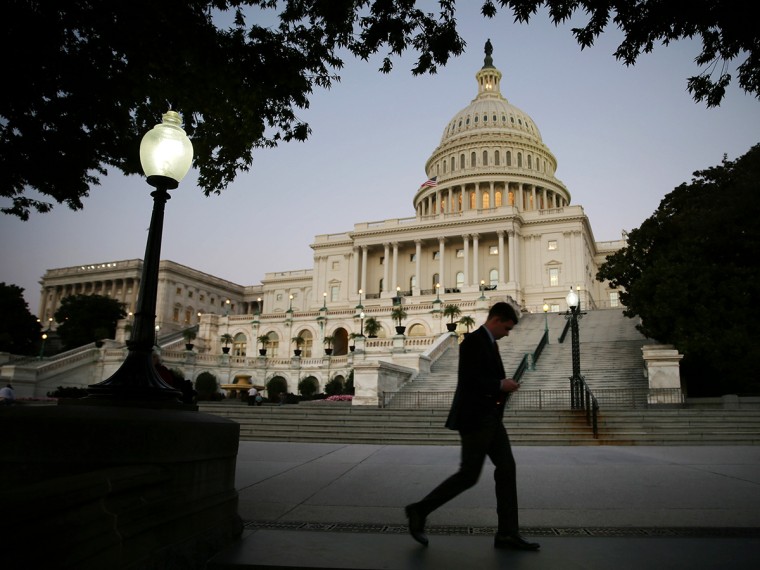In his Oval Office address last night, Donald Trump only mentioned his government shutdown once -- and he blamed the breakdown on Democrats. It was a difficult claim to take seriously given that the president already vowed to take responsibility for his own gambit.
But after Trump was done, Congress' top two Democratic leaders -- House Speaker Nancy Pelosi and Senate Minority Leader Chuck Schumer -- chose to talk about little else, explaining that the White House's demands for a pointless border wall have created an easily avoided fiasco.
"American democracy doesn't work that way. We don't govern by temper tantrum. No president should pound the table and demand he gets his way or else the government shuts down, hurting millions of Americans who are treated as leverage. [...]"Make no mistake: Democrats and the President both want stronger border security. However, we sharply disagree with the President about the most effective way to do it. So, how do we untangle this mess?"There is an obvious solution: separate the shutdown from the arguments over border security. There is bipartisan legislation -- supported by Democrats and Republicans -- to re-open government while allowing debate over border security to continue."
This has the added benefit of being true. The House plan to end the shutdown passed last week with bipartisan support -- a half-dozen GOP lawmakers broke ranks to support the resolution -- and the Democratic package mirrors the one that passed the Republican-led Senate exactly three weeks ago.
What the Dems presented was a constructive way forward in which the president makes a proposal and Congress debates it -- outside of a hostage-taking dynamic. In the meantime, policymakers would agree to re-open the government, clearing the way for a more responsible legislative debate.
Schumer and Pelosi effectively extended an invitation to more Republicans to get on board with their obvious solution that would end the shutdown. Unfortunately for Trump, a growing number of GOP members are accepting that invitation.
The Washington Post reported overnight:
Divisions grew among congressional Republicans on Tuesday over President Trump's shutdown strategy, as a number of lawmakers expressed consternation over the possibility that he'd declare a national emergency to build his border wall, while others voiced some support for Democrats' plans to reopen most of the government without the wall money Trump has demanded.Ahead of a nationally televised address by Trump, Vice President Pence lobbied House Republicans behind closed doors to stand with the president, reminding them that Trump would not sign any spending bills passed by Democrats unless he gets the wall funding he wants and urging them to reject the Democratic strategy.But in a potentially perilous sign for Trump on the 18th day of the partial shutdown, cracks were multiplying within GOP ranks even before Pence ventured to Capitol Hill late Tuesday.
Part of the problem for the president and his team is in the House, where Republican agita is clearly growing. In fact, Politico reported this week, "Several dozen House Republicans might cross the aisle this week to vote for Democratic bills to reopen shuttered parts of the federal government, spurring the White House into a dramatic effort to stem potential GOP defections."
But the breakdown in Republican unity is even more acute in the Senate, where Sen. Lisa Murkowski (R-Alaska) joined Sens. Cory Gardner (R-Colo.) and Susan Collins (R-Maine) in endorsing the House's bipartisan fix. Sen. Shelley Moore Capito (R-W.Va.) yesterday inched closer to the sane camp.
Even Sen. Marco Rubio (R-Fla.) told CNN he would "potentially" support voting on bills to reopen specific agencies without a deal on Trump's border demands.
The legislative arithmetic matters: despite a Congress divided along partisan lines, with each chamber led by a different party, we've reached the point at which a majority of the House and a majority of the Senate support the same resolution to the president's shutdown.
The pressure on Senate Majority Leader Mitch McConnell and his apparent bosses in the White House is only going to intensify.
